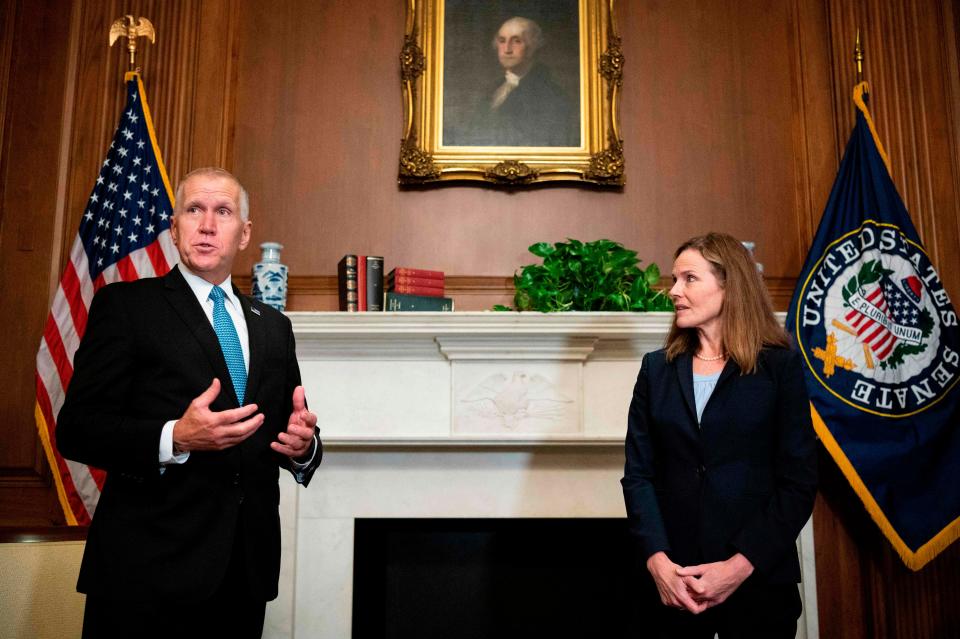Sen. Kyrsten Sinema's compromise immigration deal dead for now as Title 42 deadline nears
- Oops!Something went wrong.Please try again later.
A last-ditch effort by Arizona Sen. Kyrsten Sinema to provide an estimated 2 million undocumented youth with legal status in exchange for stronger border security measures failed to gain enough support in the U.S. Senate to reach the 60-vote threshold needed to advance legislation.
The collapse of the bipartisan framework pushed by Sinema, who last week left the Democratic Party to register as an independent, and Sen. Thom Tillis, R-N.C., also means that Congress likely will end its lame-duck session without addressing immigration reform.
The proposed agreement would have provided undocumented youth known as Dreamers a decade-long path to citizenship in the United States, in exchange for keeping in place for one more year Title 42, which allows the U.S. government to turn away certain migrants at the border. The pandemic health rule is scheduled to be phased out Dec. 21.

It would also increase funding and hiring for U.S. Border Patrol agents and would change the country's asylum system to adjudicate and expedite claims directly from the U.S.-Mexico border rather than add them to the growing immigration court backlog.
"Look, we all know that the situation on the border is untenable," Sinema told Phoenix radio station KTAR on Thursday morning. "We know that it's about to get worse as Title 42 ends due to a court order next week."
Sinema touted this bill as a first step to overhaul the country's immigration system but said it didn't address other much-needed reforms that, for example, could reduce the farmworker shortage in this country.
Although the framework for the compromise still can be used when Congress begins its new session Jan. 3, the prospects for passing contentious legislation, such as immigration reform bills, will be tougher since Republicans will hold control of the House while Democrats retain control of the Senate and the White House.

Sinema and Tillis' compromise bill was designed to shore up support from both Democrats and Republicans. But its provisions also drew criticism.
Immigration advocates praised the pathway to citizenship for Dreamers, but criticized extending Title 42 for an additional year. Critics, meanwhile, labeled the agreement as amnesty, despite the border security provision in the bill.
Legislation to provide Dreamers a pathway to citizenship has consistently failed in Congress since the DREAM Act was first introduced in 2001, despite overwhelming support from Americans from all political affiliations.
A post-election survey of 1,500 voters in four battleground states, including Arizona, conducted by the Global Stategy Group and published on Monday showed that 69% of respondents supported a compromise bill that would create a pathway for citizenship for Dreamers while boosting border security investments. About 23% of respondents said they would oppose it.
At the moment, about 613,000 Dreamers are shielded from deportation and allowed to work legally under Deferred Action for Childhood Arrivals, or DACA. But the future of the program remains on shaky ground after the 5th U.S. Circuit Court of Appeals in New Orleans ruled in October that the 2012 version of DACA was unlawful. A federal judge in Texas is expected to rule on the legality of a fortified version implemented in October.
Meanwhile, attention along the U.S. border remains fixated on Title 42. The rule has allowed U.S. border officials to immediately expel migrants from Mexico, Guatemala, El Salvador, Honduras and Venezuela back to Mexico. Since it took effect in March 2020, U.S. border officials have turned away more than 2.2 million people.
Opinion:Gov. Doug Ducey's border 'wall' is inconsequential. We'll quickly forget it
But starting Dec. 21, if Title 42 goes away as anticipated., U.S. border officials will have to take in and process all migrants under existing immigration rules. The move is expected to lead to an increase in apprehensions along the U.S.-Mexico border.
To date, the Biden administration has not shared many details about how officials are preparing for the end of Title 42. White House Press Secretary Karine Jean-Pierre said Thursday they would share more details next week.
“We have an intensive all-government effort underway to prepare," she said. "We'll have more to share ahead of the 21st deadline. But in the meantime, DHS is surging resources to the border."
This article originally appeared on Arizona Republic: Kyrsten Sinema's compromise deal on Dreamers, Title 42 dead for now

